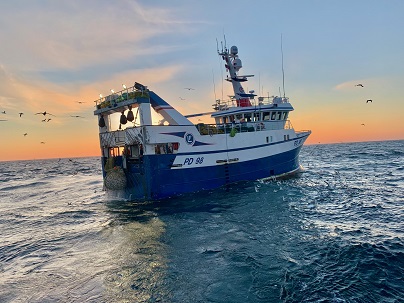Ocean going fishing vessels make use of power trains and propellers designed for the harshest of environments
Harsh weather and high seas require both hardy fishermen and boats alike to withstand the rigours of the ancient trade of gathering fish from the deep seas. The environment hasn’t changed over the passing centuries but the equipment the fishermen use has advanced to a level that makes survival less of a lottery than of days gone by.
Lunar Fishing, a company that sails from Peterhead in Scotland, has been operating for many years and consequently knows the perils of the open sea better than most. The experienced fishermen often spend their working hours in the North Sea and the Atlantic Ocean off the Scottish coast, where they trawl and pair trawl for whitefish for both the United Kingdom as well as for the European market.
High quality equipment
Lunar Fishing places heavy emphasis on the quality of the equipment that it uses and currently, it has four custom-built boats in operation from its base in Peterhead. All of these boats were built at Karstensen’s Shipyard in Skagen, Denmark and two of the vessels have CP Marine Gear, propellers and thrusters from Danish marine propulsion specialist, Hundested Propeller, as part of the high tech equipment installation.
According to fisherman Philip Stephen, there’s a good reason for this. He says that in the conditions in which Lunar Fishing often operates while at sea, the crew must have full confidence in the boats.
“When the weather is at its worst, the stress on the engine can easily reach almost 100 percent. It goes without saying that we need extraordinary, high-quality equipment,” he says.
A veteran of the trade, Stephen, who has fished for Lunar Fishing for nearly 16 years, believes that Karstensens has long been a trusted supplier to his company so, when they recommended Hundested Propeller, they were happy to go along with the suggestion.
“Subsequently, Hundested Propeller’s products have become a requirement for us on all future ships because we know what we are getting, and we know the machine parts can withstand the tension and stress they are exposed to,” he adds.
According to Kent Damgaard, director and marine engineer at Karstensens Shipyard, companies such as Lunar Fishing are interested in innovative products that optimise fuel consumption and thus reduce the CO2 footprint as much as possible.
“In this field, Hundested Propeller has been working on the design of its propellers so that the customer is getting the best possible approach, both in terms of the underlying quality of the equipment but also in terms of the best possible way of utilising it whilst meeting their ambitions in terms of environmental impact. We have used Hundested Propeller’s products for more than two decades and we will continue to do so,” he says.
Mixed Fleet
The fleet of vessels at Lunar Fishing comprises a mixture of equipment from Karstensens Skibsværft shipyard in Denmark. “Ocean Harvest” and “Harvester” are twin ships, both built in 2008 with a length of 28.35 metres and a tonnage of 349 tonnes. They’re equipped with 671kW motors with ample power for ploughing through the rough North Sea and Atlantic Ocean.
The latest companions to these two vessels are on order for delivery in late 2024 and comprise two further ships from the same yard, each of which packs even more power with the cleaner 735kW motors from Hundested Propeller. “Vigilant” and “Ocean Way” are longer than their sister ships at 36 metres and weigh in for battling the high seas at 520 tonnes.
According to Lunar Fishing, with projected landings for 2023 totalling over 70,000 tonnes of fish, around one third of which will be mackerel. The two additional whitefish vessels arriving in 2024 will be larger than the current vessels and will be able to more fully utilise the whitefish quotas that Lunar holds for the west of Scotland and Faroe sea areas.
After Sales Service and Support
With over 8000 hours spent at sea each year, Lunar Fishing’s vessels are pushed to the limit and they need to spend as much time as possible at sea so that they can maximise their yield. Lost time can be damaging for the business and so whilst the boats are at sea, they need to avoid downtime, which can be critical for the company’s turnover. As such, problems with machine parts and components often need to be solved on the spot to avoid sending the vessel back to port. Luckily, this is rarely an issue, as Philip Stephen explains.
“We always bring spare parts on the boats, and we can deal with problems with machine parts while at sea. However, if the problem is more complex, it’s absolutely crucial that we can get support from the manufacturer right away. In my sixteen years in the fisheries industry, we only needed extended support once and Hundested Propeller got us back up and running quickly after just one call,” he says.
On those rare occasions when it may be necessary to return to port earlier than expected, the crews of the fishing boats trust in the rapid response time that has been promised by the Danes.
Stephen goes on to explain that If they are not able to repair the vessel themselves, they at least have the confidence that Hundested Propeller will send technicians within a few days at the maximum.
“They provide unparalleled service and after-sales support, which is a decisive factor when we choose a supplier for our vessels,” he says.
- UK manufacturing steps up to COVID-19 crisis - April 2, 2020
- Clustering Innovation - March 12, 2020
- A Global Monitor - March 6, 2020

